Nasu Dengaku is a delightful Japanese dish that showcases the rich flavors of grilled eggplant topped with a savory-sweet miso glaze. This seasonal delicacy is not only a feast for the senses but also a celebration of summer’s bountiful harvest. Whether enjoyed in a cozy izakaya or a refined kaiseki restaurant, Nasu Dengaku offers a unique taste of Japanese culinary tradition. If you’re curious about how this dish is made and the stories behind it, read on to discover the delicious world of Nasu Dengaku!
What is Nasu Dengaku?
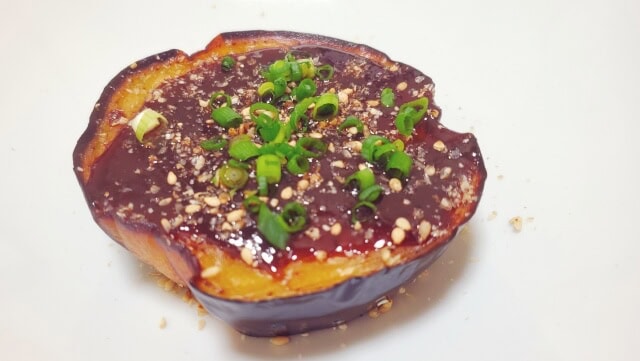
Nasu Dengaku (なす田楽) or eggplant dengaku is a classic Japanese dish featuring grilled eggplant (Nasu) topped with a sweet and savory miso glaze. Nasu is an eggplant, typically a Japanese eggplant, which is smaller and has a tender texture. Dengaku is s a Japanese cuisine comprising skewered and grilled tofu, taro, eggplant, konnyaku, and other vegetables. Nasu Dengaku is often served as a side dish, part of a multi-course meal, or enjoyed with steamed rice. The combination of smoky, tender eggplant with the sweet and salty miso glaze creates a deeply flavorful dish. It’s a great balance of umami, sweetness, and the natural creaminess of the eggplant.
Eggplant in Kyoto
Eggplants come in a wide variety of shapes and sizes, and farmers grow many varieties throughout Japan. Among them, Kyoto’s Kamo eggplant, famous as a traditional vegetable, features a large, round fruit and soft skin. Dengaku, one of the most representative local dishes, involves grilling the eggplant in oil until it turns golden brown and then drenching it in sweet miso sauce.
Nasu Dengaku History
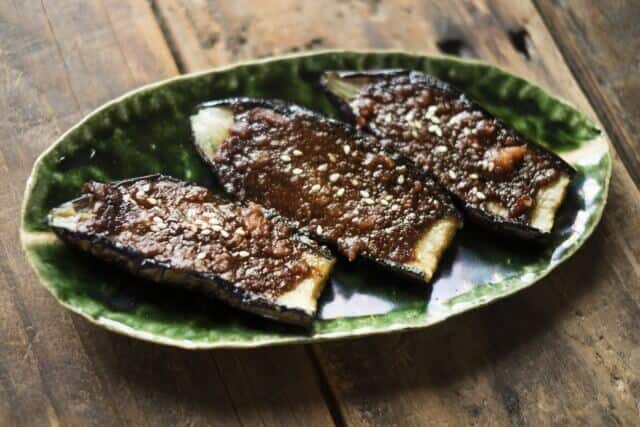
Nasu Dengaku has historical roots dating back to Japan’s Nara and Heian periods, where tofu was a key protein source for nobility and samurai in Buddhist cuisine. A custom called Dengakumai emerged during the Heian period, where dancers performed to celebrate rice planting. The name dengaku was later associated with tofu dishes, which resembled this dance. In the Edo period, various regions developed unique miso dengaku styles, including Aichi’s famous saidengaku.
In Kyoto, Kamo eggplants, known for their firmness and round shape, became a delicacy, often prepared as Kamo eggplant dengaku. These eggplants are difficult to cultivate, but their sturdy texture makes them ideal for this dish. Other regions, such as Iwate, have their own variations, like tofu dengaku with garlic, ginger, and Japanese pepper.
Season of harvesting eggplants
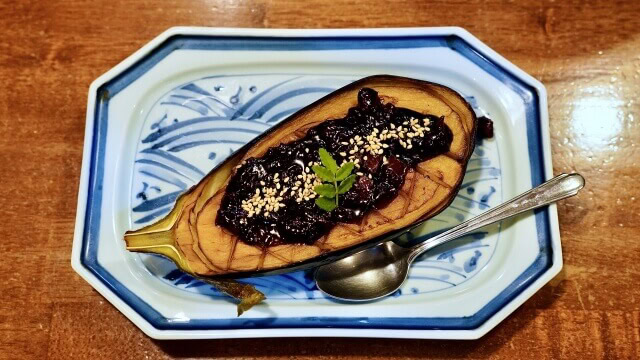
Farmers harvest Kamo eggplants from early May through early autumn, making them a popular choice during the summer months. Their unique flavor and texture feature in various local dishes, which people often enjoy at summer festivals and family gatherings. While some large Kamo eggplants can exceed 1 kg, most stores sell medium-sized ones, typically weighing between 250g and 300g. This size is perfect for preparing dishes like Nasu Dengaku, where their firm flesh holds up beautifully to grilling and glazing.
Types of eggplans for nasu dengaku
Eggplant dengaku is a popular Japanese dish that showcases the versatility of eggplant. While a variety of eggplant varieties can be used, some are particularly suited to this preparation.
Round eggplants, about the size of a baseball, are a popular choice because of their soft texture and ability to hold their shape when cooked. American or Western-style eggplants, known in Japan as ‘beizu-nasu’, are also excellent for dengaku.
Their firm flesh resists breaking down during cooking, allowing them to retain their shape when glazed with miso.
Medium-long aubergines, such as the Sennari variety, are also often used, as they offer a good balance between size and accessibility.
Whichever variety you choose, the key to a delicious eggplant dengaku is preparation. Cooks often score the flesh of the eggplant before grilling, which allows for better heat penetration and helps the miso glaze to adhere better. This technique infuses every bite with the rich, savory flavor of miso, creating a harmonious blend of textures and flavors that captures the essence of this classic Japanese dish.
FAQ
- How to choose eggplant for nasu dengaku?
-
Select fruit with dark skin color, luster, and firmness.
- How to choose miso for eggplant dengaku?
-
The most common and traditional choice is aka (red) miso, whose rich and deep flavor goes well with eggplant. On the other hand, shiro-miso, which is slightly sweeter and has a more delicate flavor, is often used in the Kansai region. If you want to strike a balance between the two, a good option is to use a combination of red and white miso.
Nasu Dengaku Recipe
Ingredients of Nasu Dengaku
| Nasu Dengaku ingredients for 2 persons | Measurements |
|---|---|
| American eggplant | approximately 300-400 grams |
| Salad oil | 30g |
| Water | 30g |
| Hatcho miso | 16g |
| Mirin | 12g |
| Sugar | 8g |
| Ground sesame | 2g |
How to make Nasu Dengaku
Cut the American eggplant into 1.5 cm slices and make shallow cuts in a crisscross pattern on each slice to enhance flavor absorption.
Heat 1 tablespoon of oil in a frying pan over medium heat. Once hot, add the eggplant slices and fry one side until lightly browned.
Flip the eggplant slices, add another tablespoon of oil, and fry the other side until browned.
Add water to the pan, cover, and steam the eggplant until fully cooked. Once done, transfer the eggplant to a plate, then mix the miso glaze ingredients over low heat until smooth and spread it over the eggplant. Enjoy!
Recommended Restaurants of Nasu Dengaku
Hirosaku (ひろ作 )
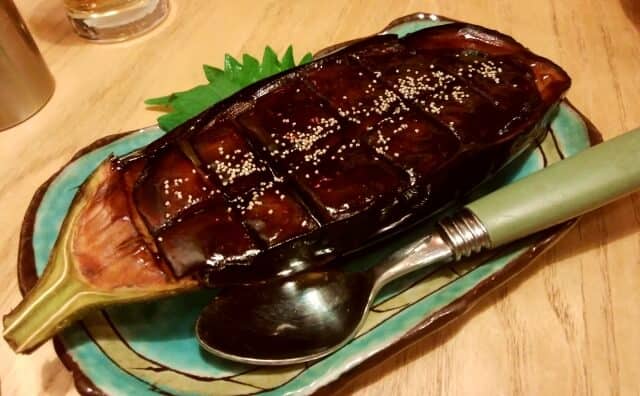
The restaurant often served Nasu Dengaku as a delicately plated course. Here, chefs emphasize the aesthetics of the dish, showcasing the vibrant color of the eggplant alongside edible garnishes like shiso leaves and sesame seeds. The miso is sweet and spicy Dengaku miso. Owner generously spread this on top.
Final Thoughts
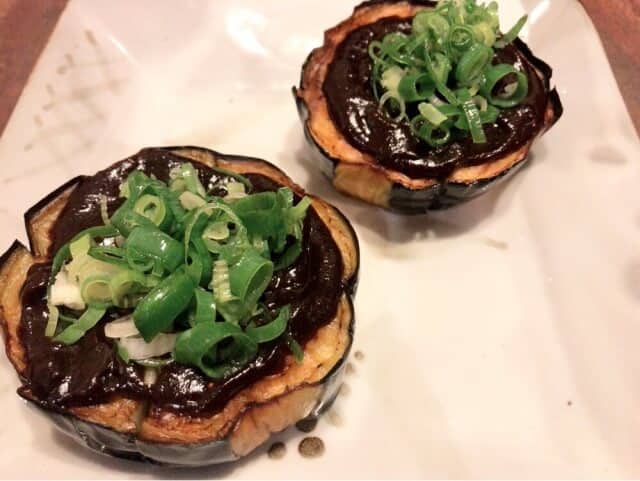
In conclusion, Nasu Dengaku is more than just a dish; it’s a celebration of summer and a reflection of Japan’s culinary artistry. We hope this article has helped you understand the unique flavors and cultural significance of this delicious eggplant delicacy. Whether you’re planning a trip to Japan or simply looking to expand your culinary horizons, we encourage you to try Nasu Dengaku. It’s a wonderful way to experience the heart of Japanese cuisine, and we believe you’ll love it just as much as many others do!
You can check some Japanese vegetable dishes that we know you would like to try too.
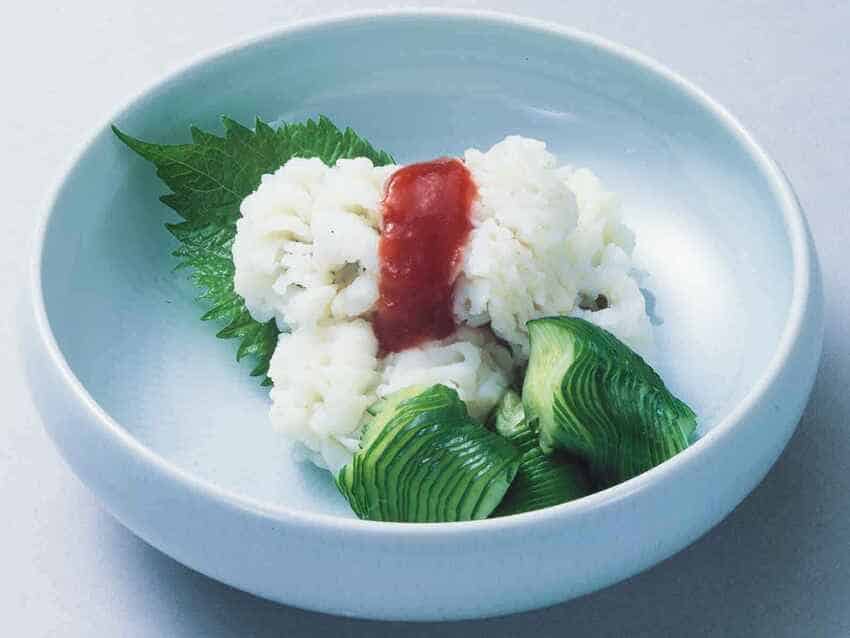
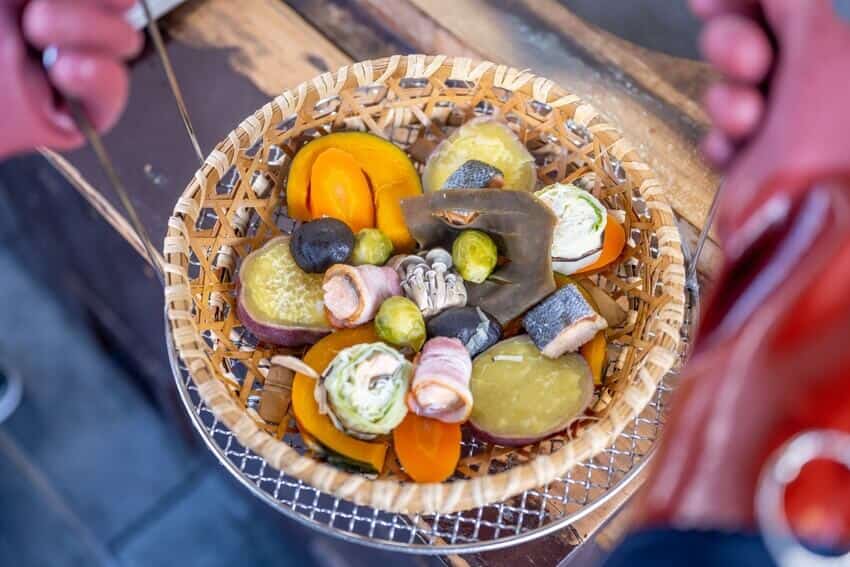
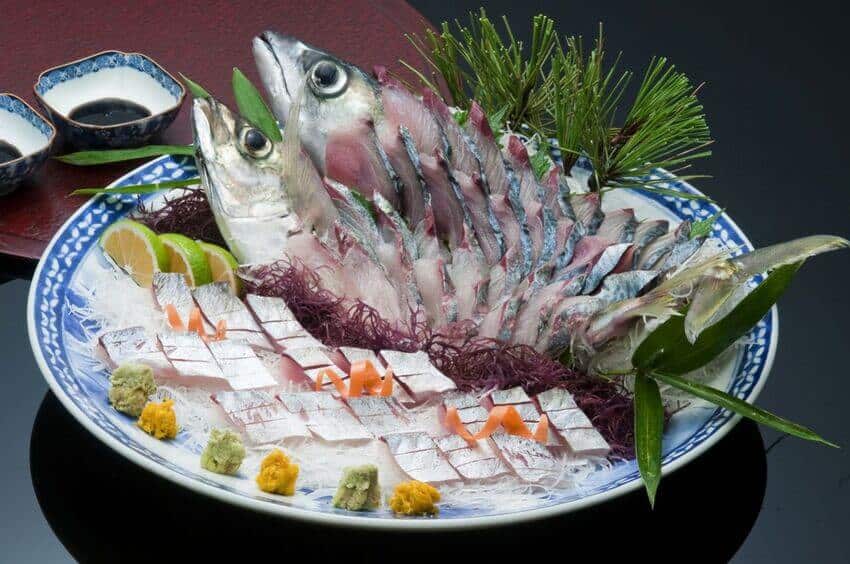
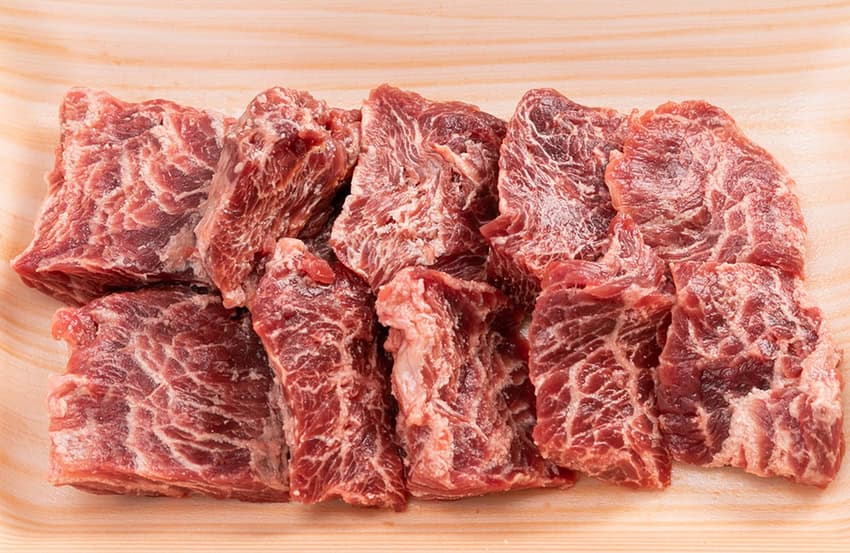


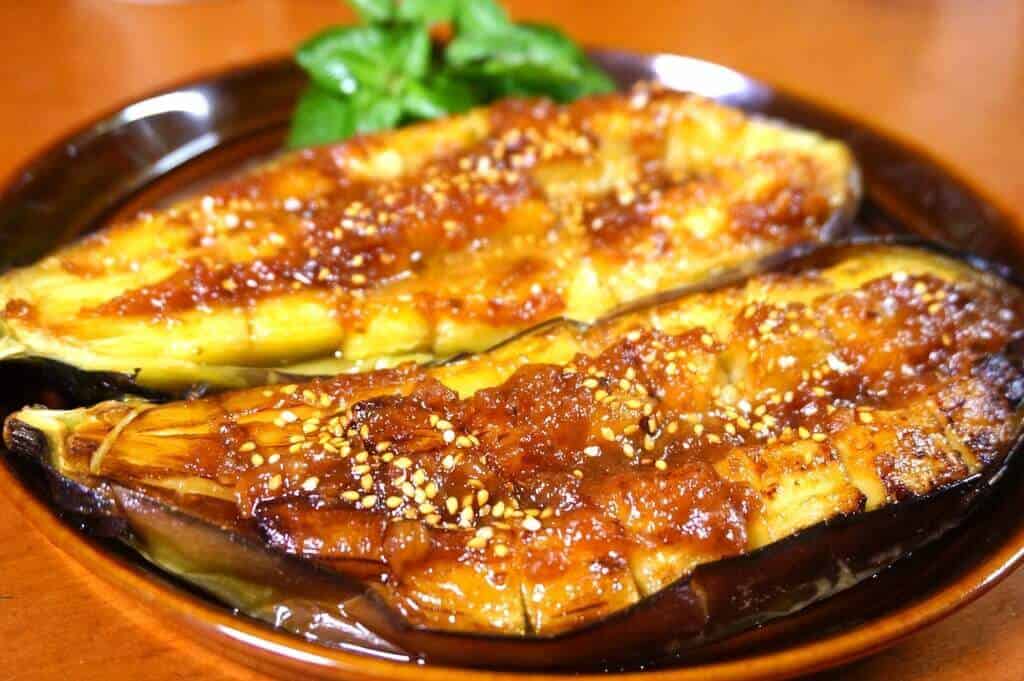
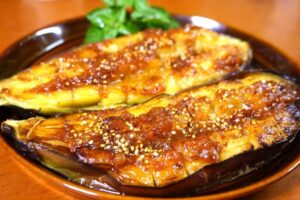
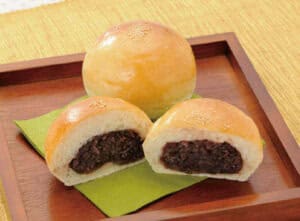
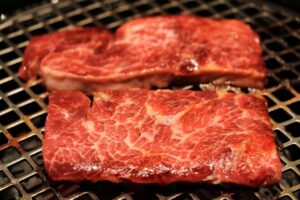
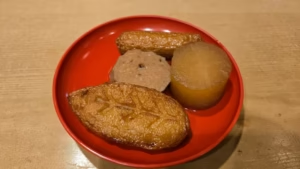

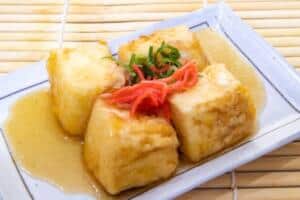
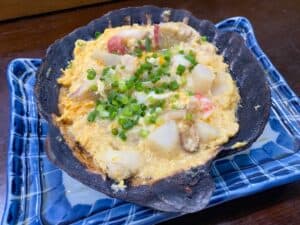
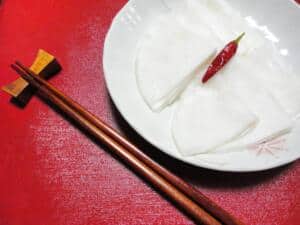
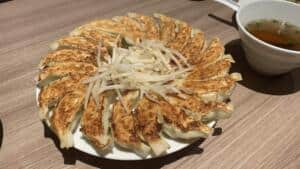
Comments